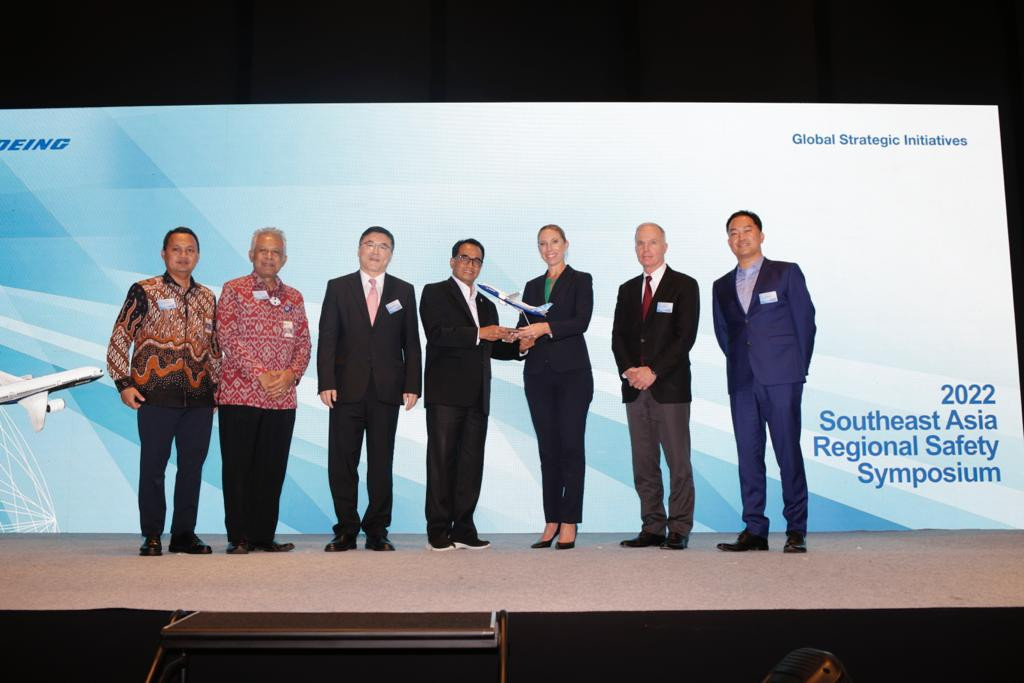Popular Reads
Top Results
Can't find what you're looking for?
View all search resultsPopular Reads
Top Results
Can't find what you're looking for?
View all search resultsBoeing promotes enhanced operational safety in the region
United States aerospace giant Boeing worked with civil aviation regulators and aircraft operators in the Southeast region to enhance operational safety through a two-day aerospace safety symposium on Tuesday and Wednesday.
Change text size
Gift Premium Articles
to Anyone
U
nited States aerospace giant Boeing worked with civil aviation regulators and aircraft operators in the Southeast Asian region to enhance operational safety through a two-day aerospace safety symposium on Tuesday and Wednesday.
Taking the theme Enhancing Operational Safety in the Post-Pandemic Era, the symposium is the first in the region and in Indonesia with an industry-wide focus on enhancing operational safety, Boeing Southeast Asia president Alexander Feldman told The Jakarta Post on the eve of the symposium on Monday.
“It is intended to promote an exchange on important aviation safety topics for Southeast Asian operators and regulators,” he said.
“Speakers from across the globe will share their perspectives on safety culture, maintaining safety excellence, pilot training and competency and maintenance.”
Feldman added that Boeing’s focus during the two-day safety symposium was on safety, quality, integrity and transparency.
Citing International Air Transport Association (IATA) data, Feldman said that Indonesia would become the fourth largest aviation market over the next 15 years
“Indonesia is one of the fastest growing economies in the world and offers growth opportunities,” he said.
Boeing forecasts that the Southeast Asia market will need 4,400 new airplanes over the next 20 years with two-thirds of this demand supporting new growth.
Meanwhile, Boeing vice president of global aerospace safety initiatives Lacey Pittman said that the aircraft maker had made changes to strengthen its safety practices and culture.
“It is a journey of continuous improvement and we are committed to working with our regulator, collaborating with our customers and the aviation industry, transparently sharing our advancements and holding ourselves accountable for our progress,” she told the Post, adding that she wanted to have a conversation with the participants on safety as well as taking inputs and feedback based on their experiences.
Pittman said that some of the changes included the implementation of an enterprise-wide safety management system (SMS), which was grounded in a positive safety culture that encouraged employees to speak up and report hazards and concerns.
Boeing has also established an Aerospace Safety Committee in its Board of Directors to oversee the safety of the company’s products and services. Another development is the creation of a product and services safety organization to further strengthen awareness, accountability and reporting of safety issues.
Taking the example of the successful field service representatives who are embedded in airlines to discuss the various maintenance issues, Pittman said that Boeing was currently recruiting and deploying its own field operational representatives.
“Field operational representatives are pilots who are embedded at airlines to discuss various operational issues with the operators including in pilot training and development,” she said.
Representatives from various sectors of civil aviation, such as Boeing, Indonesian Transportation Ministry officials, the Indonesian National Air Carriers Association as well as Indonesian and US transportation safety agencies, alongside airlines such as Garuda Indonesia, Lion Air and Fiji Airways, attended the two-day symposium.
Transportation Minister Budi Karya Sumadi delivered the closing address at the end of the first day.
When asked what steps Boeing had taken since the 2018 crash of the Lion Air 737 MAX-8 killing all 189 onboard, Feldman said that the aircraft manufacturer would never forget the accident and that it had become a core moment to remember every day in Southeast Asia.
In March 2019, another crash took place involving a 737 MAX-8 operated by Ethiopian Airlines.
“We are focused on how to never have those accidents reoccur,” he said.
He said that in fact, the MAX was now one of the safest airplanes in the air after Boeing revised the plane’s Maneuvering Characteristics Augmentation System.
Feldman said there were some 2,000 revenue flights daily using the MAX with 730,000 revenue flights having taken place since November 2020 when the US Federal Aviation Administration (FAA) allowed the MAX to fly again, totaling more than 1.8 million flight hours with a flight reliability of more than 99 percent.










